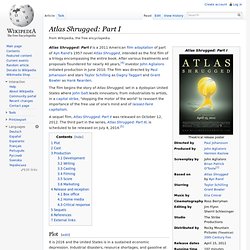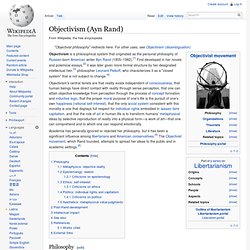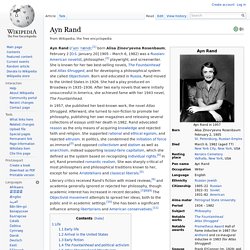

Atlas Shrugged: Part I. Atlas Shrugged: Part I is a 2011 American film adaptation of part of Ayn Rand's 1957 novel Atlas Shrugged, intended as the first film of a trilogy encompassing the entire book.

After various treatments and proposals floundered for nearly 40 years,[4] investor John Aglialoro initiated production in June 2010. The film was directed by Paul Johansson and stars Taylor Schilling as Dagny Taggart and Grant Bowler as Hank Rearden. The film begins the story of Atlas Shrugged, set in a dystopian United States where John Galt leads innovators, from industrialists to artists, in a capital strike, "stopping the motor of the world" to reassert the importance of the free use of one's mind and of laissez-faire capitalism. A sequel film, Atlas Shrugged: Part II was released on October 12, 2012. The third part in the series, Atlas Shrugged: Part III, is scheduled to be released on July 4, 2014.[5] Atlas Shrugged. Objectivism (Ayn Rand)
Objectivism is a philosophical system that originated as the personal philosophy of Russian-born American writer Ayn Rand (1905–1982).[1] First developed in her novels and polemical essays,[2] it was later given more formal structure by her designated intellectual heir,[3] philosopher Leonard Peikoff, who characterizes it as a "closed system" that is not subject to change.[4] Academia has generally ignored or rejected her philosophy, but it has been a significant influence among libertarians and American conservatives.[5] The Objectivist movement, which Rand founded, attempts to spread her ideas to the public and in academic settings.[6] Rand originally expressed her philosophical ideas in her novels The Fountainhead and Atlas Shrugged, and other works.

She further elaborated on them in her periodicals The Objectivist Newsletter, The Objectivist, and The Ayn Rand Letter, and in non-fiction books such as Introduction to Objectivist Epistemology and The Virtue of Selfishness.[7] Ayn Rand. Literary critics received Rand's fiction with mixed reviews,[6] and academia generally ignored or rejected her philosophy, though academic interest has increased in recent decades.[7][8][9] The Objectivist movement attempts to spread her ideas, both to the public and in academic settings.[10] She has been a significant influence among libertarians and American conservatives.[11] Life[edit] Early life[edit] Rand was born Alisa Zinov'yevna Rosenbaum (Russian: Али́са Зиновьевна Розенбаум) on February 2, 1905, to a Russian Jewish bourgeois[12] family living in Saint Petersburg.
